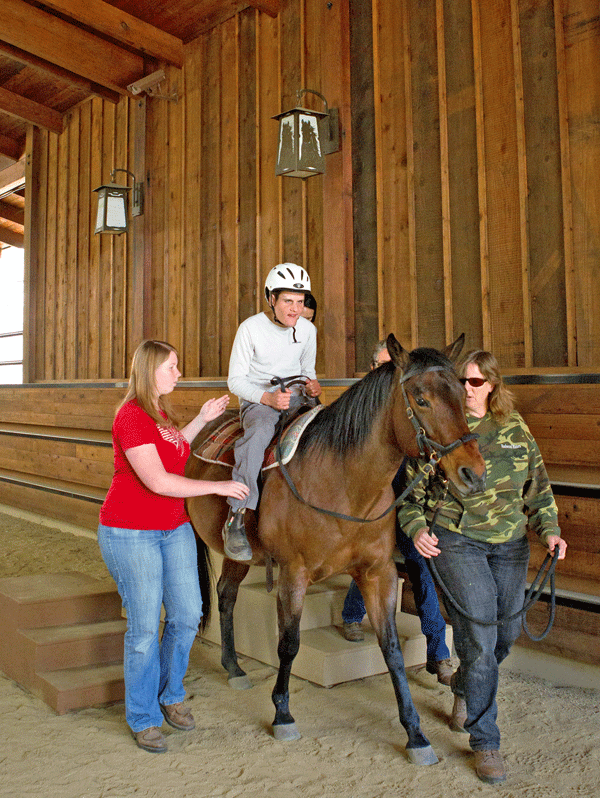Some might consider activities involving horses as being only for those with strong arms and legs. After all, these animals are large and the movies suggest that a John Wayne or Clint Eastwood type is required to control them. However, these movies don’t show the really special attributes of a horse that may be unknown too many: horses are ideal for providing equine therapy for people with a variety of special needs.
For example, a person who has trouble walking can gain strength and confidence through equine therapy. Sitting on a horse while the horse walks along is considered the closest you can get to the movements the human body makes when walking. This action helps stimulate the nerves and muscles involved with walking. There is said to be no gym equipment that duplicates the movements of a person’s walk better than sitting on a walking horse.
According to the Professional Association of Therapeutic Horsemanship International, the benefits of therapeutic riding include promoting strength, flexibility, balance, and coordination as well as boosting self-confidence and building self-esteem — essential components of any special needs program.
Therapeutic riding can help improve walking, address autism, develop muscle tone or deal with bipolar disorder or even providing a recreational experience for the vision impaired. All of these circumstances start with the realization that special needs children and adults are special people.
Recreation and exercise for one’s particular needs are important parts of their healthy lifestyle just as they are for everyone else. www.abilities.com/community/horse-therapy.html is one of many websites that speak to the therapeutic value of horsemanship. Equine Therapy Now Available at Lichen Oaks Adaptive Riding Center in Felton
Lichen Oaks Adaptive Riding Center (www.lichenoaksarc.org), a 501(c)(3) charitable organization, began operation this past spring to provide an equine experience to young as well as older people throughout the San Lorenzo Valley who have special needs. To date, LOARC has served people with cerebral palsy, Down syndrome, autism and various emotional issues. Each program is custom-tailored to the desires and needs of the participant, but generally involves on-the-ground familiarization with and tacking of a horse, as well as riding with trained side-walkers and leaders to help stabilize the participant. LOARC’s instructors are PATH certified to develop and direct the activities of each person’s program.
The mother of a participant who is benefiting from riding at the center wrote: “LOARC provides everything we have ever hoped for on our son’s behalf: a safe, beautiful and tranquil environment in which he can truly focus on learning new skills and feeling proud and happy about his accomplishments. The elusive benefits of his communication with the horse Hallie are no doubt reflected in the fact that he exhibits no resistance or challenging behavior whatsoever in the LOARC environment. This is very rare. We really can’t thank the center’s founders, instructor, and the many volunteers enough.”
Beyond the instructors, volunteers are trained at the center to become more familiar with horsemanship and therapeutic riding and provide support to the activities. Parties interested in becoming part of the LOARC program either as a participant or a volunteer may contact the center at in**@***rc.net.













